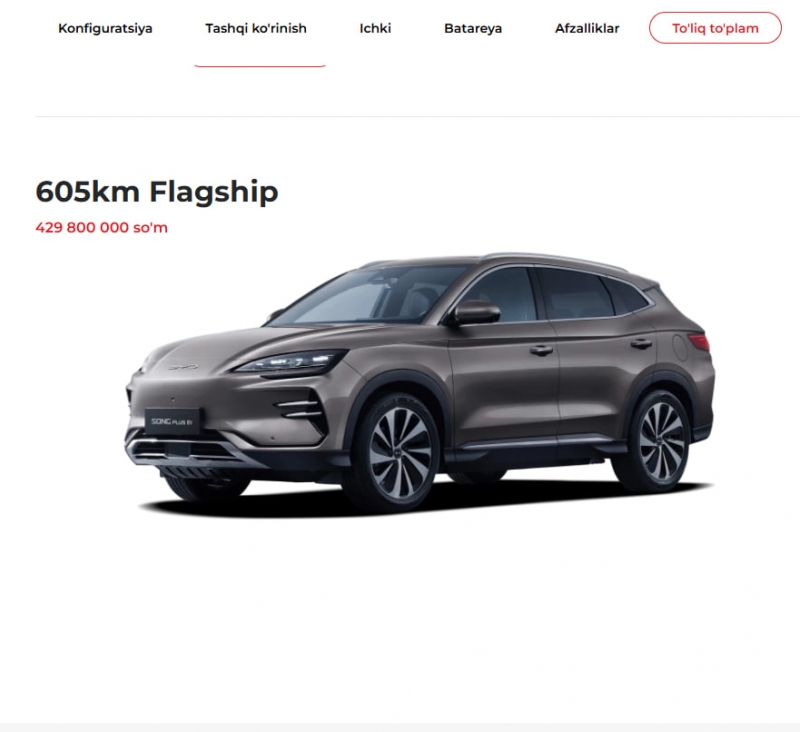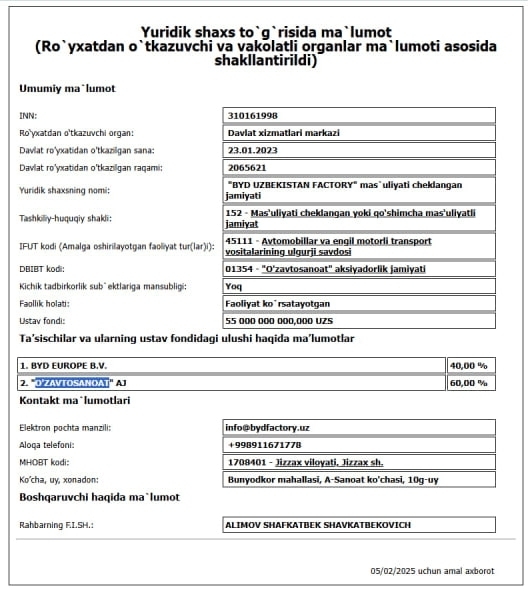Rising cost of electric cars: How the utilization fee is reshaping the market
Review
−
06 February 2025 21367 8 minutes
Uzbekistan imports more than 20,000 electric cars annually. However, the utilization fee for these vehicles has now been increased to 78.5 million sums. Will this lead to higher prices? Today, we will discuss the costs associated with importing electric cars, the rising utilization fees, the pricing strategy of BYD Uzbekistan, which remains exempt from all fees, and the undisclosed details of the utilization fund that has been collected for the past five years.
First, let’s clarify what utilization means in this context. The utilization fee is a charge imposed to ensure environmental safety, protect public health, and mitigate the negative impact of waste generated by vehicles, self-propelled machinery, and their trailers once they reach the end of their operational
life.
Skyrocketing disposal costs
The sharp increase in disposal fees for imported electric vehicles is outlined in the Cabinet of Ministers' resolution titled "On Additional Measures to Finance the Organization of Infrastructure for the Disposal of Batteries of Vehicles with Electric Engines." According to this resolution, effective May 1, 2025, the disposal fee for imported electric vehicles will range from 45 million sums to 78.5 million sums, depending on the year of manufacture.
Previously, entrepreneurs importing electric vehicles less than three years old paid 11.25 million sums for the disposal fee, which was equivalent to 30 times the MRP (minimum reference price). Under the new policy, this cost has skyrocketed to 45 million sums, which is 120 times the MRP.
For electric vehicles older than three years, the previous disposal fee was 33.75 million sums (90 times the MRP). However, it has now surged to 78.75 million sums, equivalent to 210 times the MRP.
Who is responsible for the disposal of electric cars?
The resolution signed by Prime Minister Abdulla Aripov states that its goal is to expand the use of green technologies in Uzbekistan, ensure the safe disposal of used electric car batteries, and accelerate localization efforts in the sector. However, one key question remains unanswered: who is actually responsible for the disposal of electric cars in Uzbekistan?
It seems that no one is. Why? When we inquired which ministry or organization handles this issue, officials responded with indifference, saying, "We are not interested." Even an online search did not yield an answer.
According to QALAMPIR.UZ sources in the Ministry of Ecology, Environmental Protection, and Climate Change, the ministry does not oversee the disposal of electric cars. When we contacted the Customs Committee, they clarified that customs officers are responsible for collecting the disposal fees on imported electric cars, but the funds go directly to the state budget.
This raises more questions than answers. How many cars have actually been disposed of so far? How have the collected funds been spent? And how much of the money allocated to the state budget comes specifically from disposal fees?
Public activist and economist Otabek Bakirov has raised similar concerns on his Telegram channel. He questions where the disposal fees collected over the past five years have gone.
“Nobody knows. No one knows where the disposal fee, which was introduced in 2020 to limit imports, is going, who is distributing it, or what it is being used for.
Neither the revenues nor the expenses from the disposal fee have ever been disclosed in the budget. The public is left in the dark, even parliament. This fee is not a tax—taxes must be approved by parliament—but rather an arbitrary tribute.
And that’s not all. The irony is that the decision to increase the disposal fee fourfold was assigned to Khujayev, the official responsible for Uzbekistan’s accession to the WTO.
How does Khujayev justify introducing and then quadrupling a disposal fee during WTO negotiations—effectively restricting imports—while granting privileges to local speculators through secret decisions and loopholes? Or are we planning to delay joining the WTO?” the economist asked.
How many electric cars are imported into Uzbekistan per year?
According to the Statistics Committee, 24,095 electric cars worth 224.8 million US dollars were imported into Uzbekistan in 2024. The breakdown by country is as follows:
- China – 23,982
- Kazakhstan – 51
- Hong Kong – 17
- Germany – 15
- UAE – 13
- USA – 10
Will a price increase kill the electric car market?
Every entrepreneur factors in the costs of purchasing and selling a product when determining the final price. So, how will the increase in disposal fees impact the electric car market?
"Of course, an increase in disposal fees directly affects the price of electric cars. At customs, about $1,000 was previously paid per car. Now, this amount has risen to $2,500–$2,600. The disposal fee is collected along with customs fees when the car is imported into Uzbekistan. However, I have no idea where the money goes or how it is used.
In general, why should an entrepreneur be responsible for the disposal fee? Entrepreneurs import and sell electric cars, but they have no control over whether or when the cars will be scrapped. In other countries, disposal fees are paid at the time of disposal," says one entrepreneur.
In Uzbekistan, however, disposal fees are collected in advance, even though it is uncertain whether the car will ever be scrapped.
Let's break down the costs using the example of an electric car. According to the entrepreneur, the best-selling BYD Song Champion costs $22,000. Under the old pricing system, the total customs cost was as follows:
- Utilization fee: 11,250,000 sums
- VAT (12%): 39,000,000 sums
- Certification fee: 5,500,000 sums
- Declarant fee: 1,000,000 sums
This means that to import a BYD Song Champion worth $22,000, an entrepreneur previously had to pay 56,750,000 sums at customs.
However, with the increase in disposal fees, starting from May 1, the cost will rise dramatically. For electric cars that are no more than three years old, the entrepreneur will now have to pay 90,500,000 sums, an increase of 33,750,000 sums.
This sharp rise in costs will inevitably drive up electric car prices in the market, potentially slowing down adoption and limiting accessibility for consumers.
If you remember, it was previously announced that electric cars would be produced in Uzbekistan in collaboration with BYD. Some may now wonder whether these locally produced electric cars will also be subject to disposal fees.
According to the resolution of the President of the Republic of Uzbekistan dated December 19, 2022, titled "On Measures to Support the Organization of Electric Car Production by the State," electric and hybrid cars produced within the country are exempt from disposal fees until January 1, 2030. Additionally, components, raw materials, technological equipment, and spare parts imported from abroad for production are also exempt from customs duties.
Furthermore, until manufacturers fully master full-cycle production processes, but for no more than 24 months from the project's start, they are permitted to import electric and hybrid cars without paying customs duties or disposal fees. This applies to up to 50 percent of their production capacity, but no more than 10,000 vehicles per year, in the form of semi-knocked-down (SKD) kits or completely built-up (CBU) vehicles for mass production.
So, if BYD Uzbekistan Factory and BYD Central Asia are exempt from customs duties and disposal fees, does this mean that electric cars imported by private entrepreneurs—who pay all fees in a lump sum—will have significantly different prices? Let's compare.
The figures provided by an entrepreneur importing BYD electric cars to Uzbekistan show a stark difference. For example, the BYD Song EV Champion 605 km model is sold on the black market for 351,000,000 sums. This is the price of an electric car that the entrepreneur imported after paying multiple customs duties and disposal fees.
Now, looking at the official website of BYD Uzbekistan Factory, which is exempt from all taxes, the same model is being sold domestically for 429,800,000 sums.

Take a look at this: "BYD Uzbekistan Factory", which is exempt from all payments, sells each electric car for 78,800,000 sums—$6,000 more than an entrepreneur who pays the full customs fees.
So, do we call our monopolistic "Uzavtosanoat" a mere disciple in this game? No. It would be more accurate to call it not a disciple, but a partner.
"BYD Uzbekistan Factory" Limited Liability Company was established on January 23, 2023. The majority shareholder, owning 60% of "BYD Uzbekistan Factory" LLC, is "Uzavtosanoat" JSC. Yes, you read that correctly—60% of this company belongs to "Uzavtosanoat".

At this point, a legitimate question arises. A private entrepreneur importing an electric car from abroad is required to pay a disposal fee in advance. The justification? To prevent environmental harm in the future. But if electric cars produced in Uzbekistan are exempt, does this mean they pose no environmental risk?
Economist Otabek Bakirov raised a critical question regarding the special benefits given to BYD Uzbekistan:
"To those who granted this privilege—if electric cars imported without a disposal fee are being sold at higher prices than those imported with a disposal fee, then what was the purpose of this exemption? Why should Uzbekistan’s budget and taxpayers bear this burden just to enrich a handful of new oligarchs?"
No matter what happens, the system always seems to favor "Uzavtosanoat". What are your thoughts? Share your opinions in the comments.


